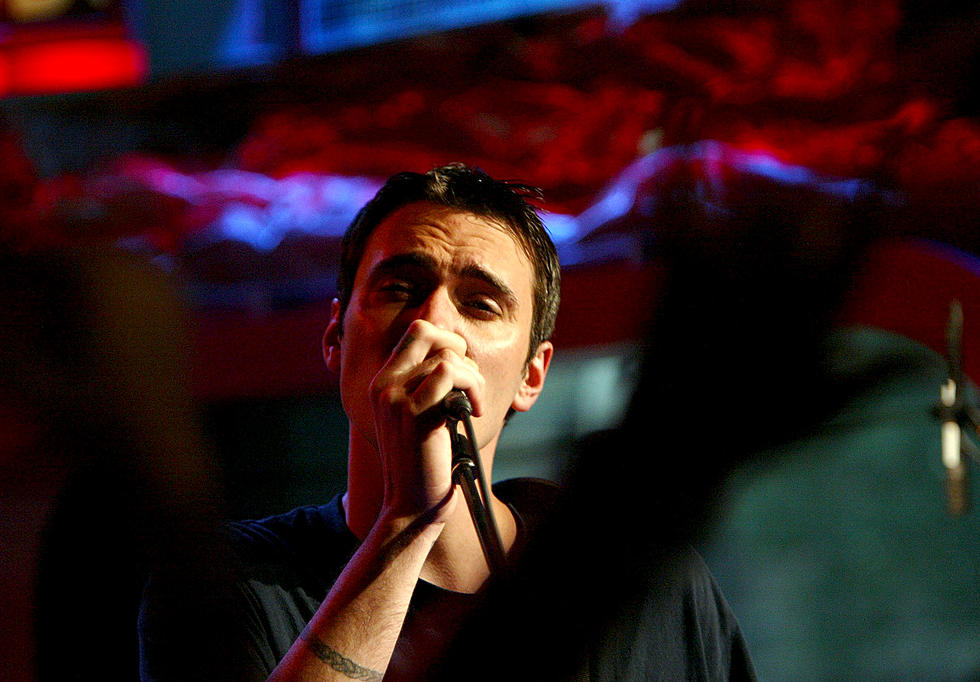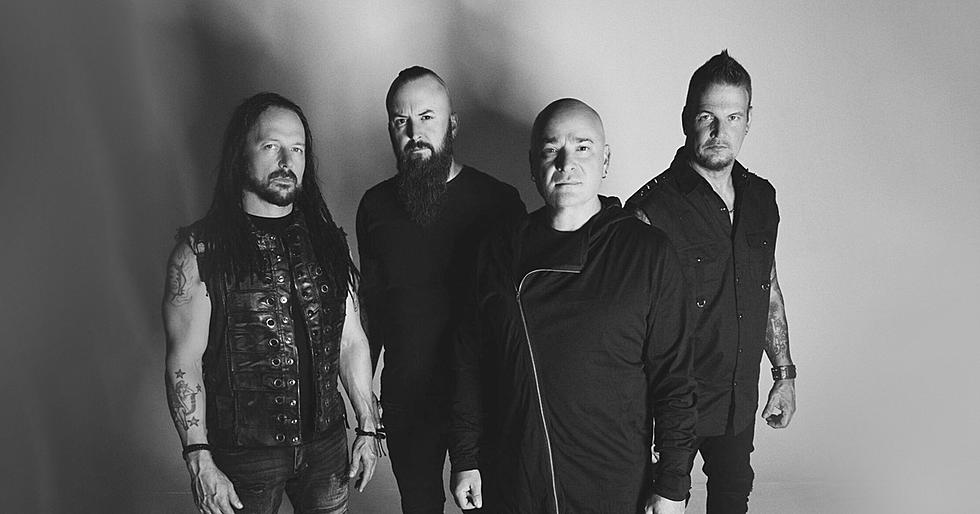
Breaking Benjamin’s Ben Burnley Talks ‘Dark Before Dawn,’ New Lineup + More
Welcome back Breaking Benjamin! After a hiatus and legal issues shut down the band for several years, frontman Ben Burnley is back with an all new lineup and the highly anticipated Dark Before Dawn album, which will arrive on June 23. Loudwire Nights host Full Metal Jackie had a chance to speak with Burnley about the new lineup, the forthcoming disc and got his thoughts on how the old songs sound with the new band. Check out the chat below.
Ben, you've got a new album with a whole new band. How is it different without being unfamiliar?
Well, the band is better than it's ever been. Obviously, that's the whole point of moving forward. It's to progress not digress, so we're able to you know, everybody was available to try this out and everything worked out really well. And two of the guys -- the most notable difference is that two of the guys that are in the band now, were singers in their own bands. So they were the front, they were the head guys in their own projects and so there's a lot of vocals on our albums that I would record over myself. Everybody now knows how the melodic stuff is, cause everybody can now do it on their computers. But I would basically record over myself. You know, singing, there was never any other singer in the band but me. And so I was never really able to do it justice live. But now we're able to duplicate our albums pretty much 100 percent and because they're able to sing those background vocals. And in adding another vocalist by also the same person who plays guitar, we then added an extra guitar to it. It frees me up to sing, to just sing certain songs and it allows me to play guitar. When there's a lot of guitars in the studio, like a lot of double guitars and a lot of like other parts that are what we call ear candy in the industry, those kinds of things are now being able to be played and you know, it's just really freeing.
Our drummer now in comparison to our old drummer. Now our drummer plays all of the electronic parts. Parts that are not instruments, like life going digital types of sounds. He's triggering all of those in real time via technology. And created into his drum kit, like drum pads, trigger pads. So before, we would have to put all that stuff on a track and basically play to that track. And so nobody was playing it. It was kind of playing kind of opaque, which to me was just really lame. And I really hated doing it but it was either do that or not have it in the song. And when you play live, a lot of times, just because I hate playing the track so much, that's just my personal preference. I would opt to just not have it in there. And then you're not even really playing it, giving the song its justice, because you are not playing all of the parts in the song on your album. So you pass, you know, get by with it because you play like a live version of it. But I want the live version of it to be a live version of the album. So it's still a live version but it has all the parts, you know.
Those things are very important to me in moving on, in moving forward. So I wanted to make it -- everything Breaking Benjamin has always been plus four. And now it finally is because everybody's capable of doing what needs to be done to bring the music to where it needs to be. And now that we can play everything in real time and all of the instruments are, everything you see in a Breaking Benjamin show, everything you hear is being played by somebody -- it's not on a track, not listening to a tape. Every single bit of it is being performed by a human being in the band. So it's really cool just to be able to say that. And it also makes it so that we don't have to play to a click track any more.
A lot of people -- I'm like divulging a lot of these little secrets -- but a lot of bands will have this like in-ear monitor, like the ones that you see inside our ear with that wire coming down. That has like a click in it which is like a metronome - click, click, click, can you hear? And you play to it all at the same time. And you also play to it as their tracks lineup, what they're playing. But we don't have any of that. We just basically go up and we play the song, and it's just free. You know it's like a real experience for us because we don't have to rely on listening to it click -- like we're listening to the song as we're playing it. It's just really cool to do, like really organic but yet embracing digital aspects of technology at the same time. It's really exciting.
Nobody asks for litigation as a creative tool. How did the lawsuit involving the old band members fuel you creatively?
That's something that's unfortunate. Nobody ever wants to get into that. I look at that more as a hinderance with the position that I was put in rather than a position that I welcomed. I was left with no alternatives, so it's not a fun aspect and I think that maybe a little bit of that -- that turmoil that anybody would feel during any conflict, be it legal or physical -- would leak into their subconscious and make its way into an attitude towards the music as far as the aggression aspect or the darker aspects of the music. As far as that stuff goes specifically, I'm level headed enough that I can just leave that behind me and not really utilize it, just leave it behind as garbage that it is and do my best to thrive in a negative situation. If it was the other way around, I would have known the right thing to do and I would have done it immediately. That's just me. I can't determine or dictate how other people should behave themselves. But if it was the other way around, it would have been much different because I don't want anything that doesn't belong to me.
Ben, what was most important to you when it came to deciding which musicians would be right for this band?
I was fortunate enough through the years I've been playing to have met every single person that's in the band now, so it's not like I met them in an audition. I had known them for a long time before we had even played. That factored into making the decision to see how it would go if we were to get together. Keith, the guitar player and a fantastic singer is from a band called Adelitas Way who I've toured with quite a bit. The other guitar player, who plays a lot of the digital stuff, he is from a band called RED. Then the drummer, who also does a lot of the digital stuff live, he's from a band called Picture Me Broken and he has been a fan and friend of mine for a long time. The bass player is a friend of mine from way back in the day who I've known the longest. He's from Northeastern, Pa. He was around and that's where the band got its initial following and initial launch. He was in a lot of bands, just on the scene at the same time and just never really got the break that we got. We've always wanted to play together, but there was never an opportunity. So as soon as the opportunity arose, it made sense for us to hook up and start jamming together. All of those guys are longterm friends. It just made sense to try and see if it would work, we all got together and it worked beautifully.
Ben, how much of the Dark Before Dawn music did you have before putting together the new band?
I would say about 95 percent of it was all done before we even played a single note together. Then, I wanted to incorporate and have them involved in it so we're all playing on it and there's a lot of background vocals, they're all other singers in the band. The guitar players are playing the guitars but as far as the writing is concerned, it was about 95 percent done when they came in.
What do you like most about the way your catalog songs sound now, played by different musicians who add their own musical signature?
I think we did touch base and cross that bridge with the other question where the guys are able now to play everything exactly how it is on the album. When you record something you make a record of it. You embed it into stone when you make a studio recording of something. So there really isn't much room for signatures because the part is what it is. If I was playing guitar for the Deftones or Chevelle or Tool, I would do everything in my power to play those songs exactly how they're supposed to be played and are on the album. That's what these guys do. I'm the primary writer in the band so I've already written the parts for them to play, essentially. I'm not against them coming up with anything that's going to help the music and help it lift on top of what's already been written, but I would say most of the time it's my creative outlet and their performing the parts as I would do for them if they wrote a song and brought it to me. I would play it exactly how they want me to play it. It's a mutual respect kind of thing. As far as the back catalog is concerned, we do our best to play our songs like they are, exactly like they are on the album. I believe we all do a very efficient job in dong that. There really isn't much room for anybody's personal spin on it because the part is written, they're just playing it as exactly how it should be which is a tremendous skill in it of itself.
Thanks to Breaking Benjamin's Ben Burnley for the interview. The Dark Before Dawn disc is available for pre-order at Amazon and iTunes ahead of its June 23 street date. You can find the band's tour dates here. Tune in to Loudwire Nights With Full Metal Jackie and Tony LaBrie Monday through Friday 7PM through midnight online or on the radio. To see which stations and websites air ‘Loudwire Nights,’ click here.
More From WGBF-FM





![LOOK: Disturbed Falling In Reverse & Plush Live at Evansville Indiana’s Ford Center [PHOTOS]](http://townsquare.media/site/72/files/2024/02/attachment-disturbed-11.jpg?w=980&q=75)




